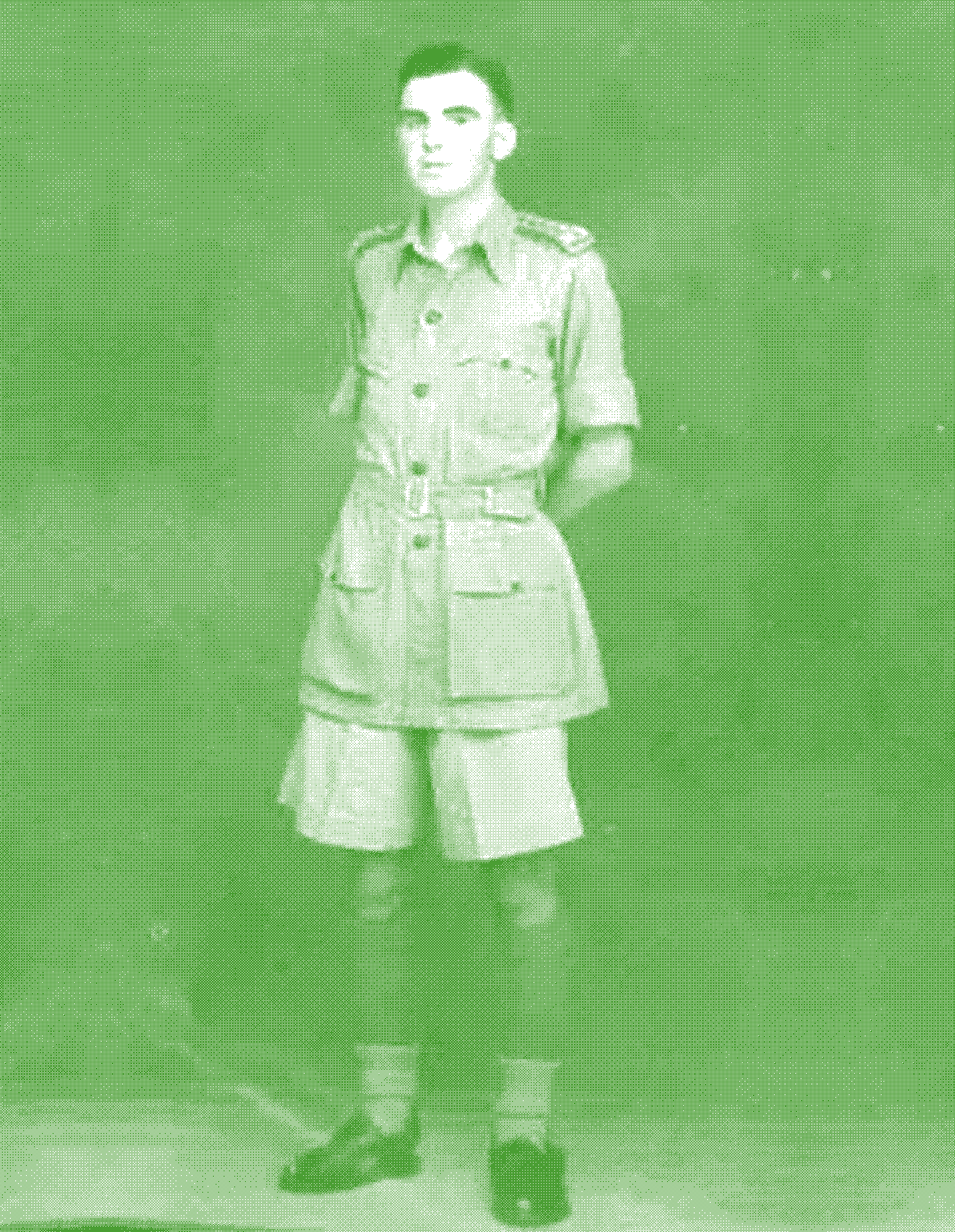Picture shows Arthur Marment
Interview:
Charles Marment, son of Arthur Marment, an officer in India fought with Sikh VC winners.
Location of Origin: Cardiff
Regiment: 15th Punjab Regiment Regiment, ‘B’ Coy (KHATTAKS) 4th Battalion
Commanded ‘B’ Coy (KHATTAKS) 4th Bn. 15th Punjab Regiment throughout the ARKAN Campaign 1943/44 and KOHIMA Operations May to June 1944
Charles: “…We transcribed his war diaries, but it is a book effectively, which goes from when he left school in the 1930s, late 30s, to his last day of service in 1946. We had all the diaries all lined up in a pile, and of course what happens first of all is the physicality of transcribing them, trying to decipher them, but his writing was good so it was quite easy to read, and there were all there with a small bit missing, but basically every day, sometimes there’s very little and sometimes there’s some great stuff, so its basic but it shows a very personal account of warfighting and death and downtime when you’re relaxing.”
(Father) “He comes from Cardiff, and even by the age, a very conservative man, conservative because they were austere times, the 30s, but even by that he was a very sort of careful man about what he does and how he dresses, and he’s a bank clerk in Bridgnorth , so he joined because every person understood that sooner or later, a bit like now, that the genie that was. Germany was going to get out the bottle and there would be a war, either this year or next year, whatever happened there would be a war. So he joined what was then called the Territorial Force (TA), so when war did break out he was first in list to do something because he had served already, and he pottered around in Britain, but of course after Dunkirk very little happened, but he got wind that his cousin joined the British Indian army and it was all great, of course nothing happened until pearl harbour, and everyone in the army they asked for volunteers to go fight in Burma, while most people had a view to fighting the war in Europe, fighting out of hood, but after Dunkirk there was little day to day action, everyone knew we were going to spend the next few years preparing for the invasion of D-Day, So he said sod that I’ll go to India and take on the Japanese, I’m not sure why would you inundated for a request to the Indian army, so it was accepted, but the Indian army has a very imperial protocol, they wouldn’t accept and were very rigid, the way Indian regiments were configured, they are all Indians, and when I said Indians, this is very topical I mean India pre-
separation so everyone was there, Christians, Hindus, Muslims, every tongue they can have there, and you’re commanded by a handful of British officers and a few late entry officers from …..
A) you
have a culture difference of British and Indians, and when I say Indians I mean every caste known to man, everyone, I believe in this or that god, here is a lot of competing factors so it was very easy once you had served in the army, if you had a wanker officer, it’s very easy to not get accepted, think of what’s going on in India and Pakistan at the moment , and how the hell you keep everyone together and everyone happy and focused on killing the enemy instead of each other.
(India) It’s an amazing country of space and people, colour and language, he was very good at the language although he kept failing his Urdu exams, and that’s what they demanded, very high standards of British officers. He came into his own because he wasn’t a big drinker, and of course Hindus and.. (idk who drinks) but he was fit as hell, he was a fit bloke, and a lot of men could become lazy, but he was austere, his conservatism saw him through, he was well respected and well liked. Ultimately, towards the end of the war once the fighting started he was very brave and put other people first, his medals were not for killing people, they were for carrying injured people out under heavy fire, putting himself in danger for other people, its difficult reading citations that are in public document, it was all him pulling people out under fire and that sort of stuff. Once you do that, people can trust you, and he did that and won the trust of his people.
There were loads under his command, I can lend you the diaries, it will give you good insight once you understand the lingo like nicknames and such, once you get your head round what he’s talking about it’s a very interesting read. Because there’s lot of talk of VE day, but the war in Burma has not really been covered by the nation, and people get queasy about it because of the empire and the Indian partition, that was not a good chapter in our history, such as in the partition I don’t know what you’d have done, so unfortunate being united under the British, and when the British left the started killing each other and haven’t stopped, it’s heartbreaking really, there is plenty of criticism of British empire and of course Britain couldn’t sustain maintaining India and had to walk away, it wasn’t there finest hour but the leaders and people of the country must take accountability for that. Everything about BURMA AND INDIA, Slim was the great leader, my father went through what was called the admin box and Kohima, and he was at the end up there even on the last days of the war, one of the last days, his best friend got shot, and they continued fighting.
Regiment, “when he was in Shropshire, he was in the King Shropshire Light infantry, and when he was in the Indian army he was in the 4/4 oblique 15 Punjab’s.”
Difficulty with terrain
“Well, it is hot and horrible it either rains or is baking hot. You have got to be hugely disciplined and hugely fit because you will get bitten to death by insects. But he never saw wild animals as they hid as were not used to tourists. When you get wet it is a risk due to the humidity, if you don’t look after yourself and get dry you could die quickly.
The weather is a huge factor and the Japanese gave up, not because they were weak, they just had enough. It wasn’t a question of someone won because they killed more people, the person who won was the person who could just hang on getting pissed on with rain and they just about hung on more than the Japanese. It was no victory they just held their breath slightly longer.”
Anything in writing your fathers biography that surprised you
“I was very surprised he was as normal as he was, I don’t remember him talking, he was very happy. In the diary, he gets back to Cardiff and he wonders to the driver, he doesn’t go and see his parents who are waiting downstairs he walks over to the driver and says, ‘I am never going to leave Cardiff ever again.”
“He was very happy. Even though the heroes of the war just went back to work, he ran a prison with Italian prisoners of war, who played a lot of football, before he got de mobbed.
“Nothing ever worried him, because he knew he had tested himself more than once. Most men dream about how they will be when they test themselves and some don’t measure up and are never the same and some people do but he tested himself and had the attitude of, I’ve done enough now and I will just relax. So nothing fazed him a bomb could go off and he wouldn’t flinch.”

